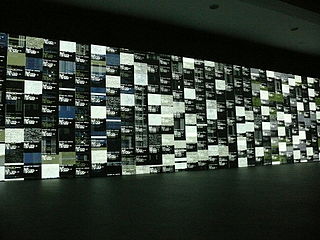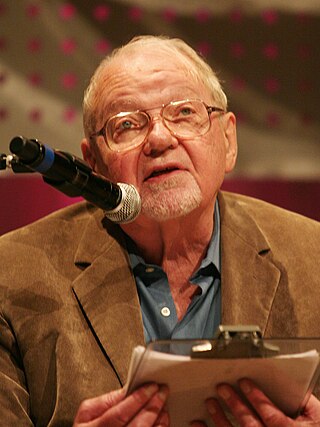
Postmodernism is a term used to refer to a variety of artistic, cultural, and philosophical movements that claim to mark a break from modernism. They have in common the conviction that it is no longer possible to rely upon previous ways of representing reality. Still, there is disagreement among experts about its more precise meaning even within narrow contexts.
Postmodern philosophy is a philosophical movement that arose in the second half of the 20th century as a critical response to assumptions allegedly present in modernist philosophical ideas regarding culture, identity, history, or language that were developed during the 18th-century Age of Enlightenment. Postmodernist thinkers developed concepts like différance, repetition, trace, and hyperreality to subvert "grand narratives", univocity of being, and epistemic certainty. Postmodern philosophy questions the importance of power relationships, personalization, and discourse in the "construction" of truth and world views. Many postmodernists appear to deny that an objective reality exists, and appear to deny that there are objective moral values.
Postmodern music is music in the art music tradition produced in the postmodern era. It also describes any music that follows aesthetical and philosophical trends of postmodernism. As an aesthetic movement it was formed partly in reaction to modernism but is not primarily defined as oppositional to modernist music. Postmodernists question the tight definitions and categories of academic disciplines, which they regard simply as the remnants of modernity.

A pastiche is a work of visual art, literature, theatre, music, or architecture that imitates the style or character of the work of one or more other artists. Unlike parody, pastiche pays homage to the work it imitates, rather than mocking it.
Late capitalism is a concept first used in print by German economist Werner Sombart at the start of the 20th century. In the late 2010s, the term began to be used in the United States and Canada to refer to corporate capitalism.

Postmodern art is a body of art movements that sought to contradict some aspects of modernism or some aspects that emerged or developed in its aftermath. In general, movements such as intermedia, installation art, conceptual art and multimedia, particularly involving video are described as postmodern.
Postmodernity is the economic or cultural state or condition of society which is said to exist after modernity. Some schools of thought hold that modernity ended in the late 20th century – in the 1980s or early 1990s – and that it was replaced by postmodernity, and still others would extend modernity to cover the developments denoted by postmodernity. The idea of the postmodern condition is sometimes characterized as a culture stripped of its capacity to function in any linear or autonomous state like regressive isolationism, as opposed to the progressive mind state of modernism.

Fredric Ruff Jameson was an American literary critic, philosopher and Marxist political theorist. He was best known for his analysis of contemporary cultural trends, particularly his analysis of postmodernity and capitalism. Jameson's best-known books include Postmodernism, or, The Cultural Logic of Late Capitalism (1991) and The Political Unconscious (1981).

Postmodern literature is a form of literature that is characterized by the use of metafiction, unreliable narration, self-reflexivity, intertextuality, and which often thematizes both historical and political issues. This style of experimental literature emerged strongly in the United States in the 1960s through the writings of authors such as Kurt Vonnegut, Thomas Pynchon, William Gaddis, Philip K. Dick, Kathy Acker, and John Barth. Postmodernists often challenge authorities, which has been seen as a symptom of the fact that this style of literature first emerged in the context of political tendencies in the 1960s. This inspiration is, among other things, seen through how postmodern literature is highly self-reflexive about the political issues it speaks to.

The Westin Bonaventure Hotel and Suites is a 367-foot (112 m), 33-story hotel in Los Angeles, California, constructed between 1974 and 1977. It was designed by architect John C. Portman Jr.. The top floor has a revolving restaurant and bar. It was originally owned by investors that included a subsidiary of Japanese conglomerate Mitsubishi Corporation and John Portman & Associates. The building is managed by Aimbridge Hospitality (IHR), and is valued at $200 million.

The postmodernist school in criminology applies postmodernism to the study of crime and criminals. It is based on an understanding of "criminality" as a product of the use of power to limit the behaviour of those individuals excluded from power, but who try to overcome social inequality and behave in ways which the power structure prohibits. It focuses on the identity of the human subject, multiculturalism, feminism, and human relationships to deal with the concepts of "difference" and "otherness" without essentialism or reductionism, but its contributions are not always appreciated. Postmodernists shift attention from Marxist concerns of economic and social oppression to linguistic production, arguing that criminal law is a language to create dominance relationships. For example, the language of courts expresses and institutionalises the domination of the individual, whether accused or accuser, criminal or victim, by social institutions. According to postmodernist criminology, the discourse of criminal law is dominant, exclusive and rejecting, less diverse, and culturally not pluralistic, exaggerating narrowly defined rules for the exclusion of others.
Post-postmodernism is a wide-ranging set of developments in critical theory, philosophy, architecture, art, literature, and culture which are emerging from and reacting to postmodernism.
Linda Hutcheon, FRSC, OC is a Canadian academic working in the fields of literary theory and criticism, opera, and Canadian studies. She is a University Professor Emeritus in the Department of English and of the Centre for Comparative Literature at the University of Toronto, where she has taught since 1988. In 2000 she was elected the 117th President of the Modern Language Association, the third Canadian to hold this position, and the first Canadian woman. She is particularly known for her influential theories of postmodernism.
In the visual arts, late modernism encompasses the overall production of most recent art made between the aftermath of World War II and the early years of the 21st century. The terminology often points to similarities between late modernism and postmodernism, although there are differences. The predominant term for art produced since the 1950s is contemporary art. Not all art labelled as contemporary art is modernist or post-modern, and the broader term encompasses both artists who continue to work in modern and late modernist traditions, as well as artists who reject modernism for post-modernism or other reasons. Arthur Danto argues explicitly in After the End of Art that contemporaneity was the broader term, and that postmodern objects represent a subsector of the contemporary movement which replaced modernity and modernism, while other notable critics: Hilton Kramer, Robert C. Morgan, Kirk Varnedoe, Jean-François Lyotard and others have argued that postmodern objects are at best relative to modernist works.

In political philosophy, particularly Frankfurt School critical theory, advanced capitalism is the situation that pertains to a harmonious and self-regulating economic system, a society in which individual freedom defines wider economic freedom or a capitalist model has been integrated and developed deeply and extensively and for a prolonged period in a freedom-based culture. The expression advanced capitalism distinguishes such societies from the historical previous forms of capitalism, mercantilism and industrial capitalism, and partially overlaps with the concepts of a developed country; of the post-industrial age; of finance capitalism; of post-Fordism; of the spectacular society; of media culture; and of "developed", "modern", and "complex" capitalism, all variants of economic freedom.
Criticism of postmodernism is intellectually diverse, reflecting various critical attitudes toward postmodernity, postmodern philosophy, postmodern art, and postmodern architecture. Postmodernism is generally defined by an attitude of skepticism, irony, or rejection towards what it describes as the grand narratives and ideologies associated with modernism, especially those associated with Enlightenment rationality. Thus, while common targets of postmodern criticism include universalist ideas of objective reality, morality, truth, human nature, reason, science, language, and social progress, critics of postmodernism often defend such concepts. It is frequently alleged that postmodern scholars promote obscurantism, are hostile to objective truth, and encourage relativism to an extent that is epistemically and ethically crippling. Criticism of more artistic postmodern movements such as postmodern art or literature may include objections to a departure from beauty, lack of coherence or comprehensibility, deviating from clear structure and the consistent use of dark and negative themes.
This is a list of articles in continental philosophy.
Subversive affirmation is an artistic performance that overemphasizes prevailing ideologies and thereby calls them into question. Simultaneously with affirmation, the affirmed concepts are revealed, and artists distance themselves from those concepts. Strategies of subversive affirmation include "over-identification", "over-affirmation" and "yes revolution".

Metamodernism is the term for a cultural discourse and paradigm that has emerged after postmodernism. It refers to new forms of contemporary art and theory that respond to modernism and postmodernism and integrate aspects of both together. Metamodernism reflects an oscillation between, or synthesis of, different "cultural logics" such as modern idealism and postmodern skepticism, modern sincerity and postmodern irony, and other seemingly opposed concepts.
Non-simultaneity or nonsynchronism is a concept in the writings of Ernst Bloch which denotes the time lag, or uneven temporal development, produced in the social sphere by the processes of capitalist modernization and/or the incomplete nature of those processes. The term, especially in the phrase "the simultaneity of the non-simultaneous", has been used subsequently in predominantly Marxist theories of modernity, world-systems, postmodernity and globalization.









